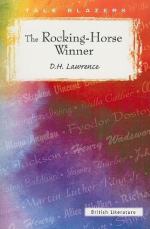|
This section contains 1,036 words (approx. 4 pages at 300 words per page) |

|
On the Back of the Rocking Horse
Summary: An analysis on D.H. Lawrence's "Rocking Horse Winner." Specifically, discusses how through the characterization, symbolism, and language of the short story, Lawrence successfully creates a materialistic image.
Written in 1933, D.H. Lawrence's short story "The Rocking Horse Winner" illustrates the consumptive nature of materialism. Through author's use of characterization, symbolism, and language in The Rocking Horse Winner, Lawrence successfully portrays a greedy and cold hearted mother, Hester, who attempts to fulfill the dissatisfaction in her life using wealth and material comfort. Lawrence uses Hester as an example to convey to the readers that materialism isolates one from love and ultimately leads to destruction.
Lawrence uses language that evokes irony and disgust to describe Hester in order to illustrate her coldness and inability to love anybody except herself. "She married for love, and the love turned to dust. She had bonny children, yet she felt they had been thrust upon her, and she could not love them." (407) Lawrence asserts that because Hester is dissatisfied with her life, and refuses to compromise on the lifestyle she expects...
|
This section contains 1,036 words (approx. 4 pages at 300 words per page) |

|


